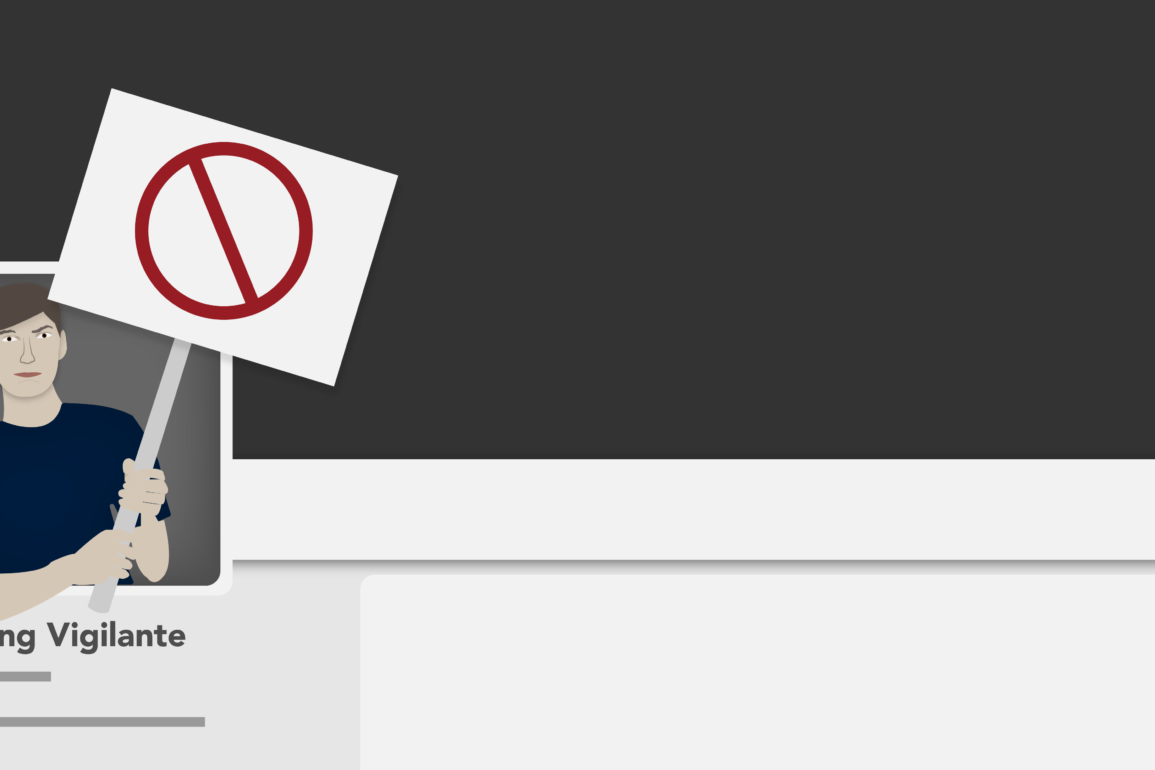Through access of the Internet, people can now discover and publish personal information of other users with malicious intent.
In 2016, on a mid-September afternoon in Vancouver, Washington, Tara Dublin was on her way to pick up her son from school—something she did almost every weekday. Driving down the street in her red Volkswagen Jetta, which had “Proud Democrat” and “A Woman’s Place is in the White House” bumper stickers on the back, she blasted the song “My Hero” by the Foo Fighters through her car’s open windows.
Tara was having a rough day. Earlier, she had been harassed on Twitter after voicing her support for Hillary Clinton. Receiving negative feedback on her political opinions wasn’t a new experience for her, but the comments especially bothered her today. With the November election happening in just a month, tensions were rising between opposing viewpoints.
As she was driving, her irritation returned. A house she frequently drove by displayed a “Trump and Pence 2016” sign and a “Hillary for Prison” poster in the front yard. The signs reminded her of the harassment she had experienced earlier.
On previous drives, she had not seen the house’s residents. Today was different, though. The man who lived in the house was standing in his driveway.
Tara did something she now wishes she could take back.
She slowed down her vehicle, honked her horn to get the attention of the man, shot her middle finger out of the side of her car’s window, and drove away. She did not expect the events that would follow.
The man jumped into his car and began driving after her, his bumper only centimeters from hers. Tara, feeling frightened, was able to flag down a police officer. While speaking with the officer, she decided to go live on Facebook. Frantically, she described what she was experiencing, stating her concerns and fears.
At the time, Tara thought nothing of the video. However, that soon changed when she became a victim of doxxing.
Doxxing, slang for “dropping documents,” occurs when an individual gathers someone else’s private information, and shares the information publicly online. Victims of doxxing often have their phone numbers, home addresses, or social security numbers released.
According to a study by Pew Research Center, half of Internet users worry about the amount of personal information about them available online—a number that has jumped from 33 percent since 2009. With increasing incidents of doxxing, this number will likely continue to grow.
Frank Breitinger, assistant professor of cybersecurity at the University of New Haven, explains that the large amount of personal information online can sometimes be useful. For example, police were able to quickly track down the suspect of the recent Stockholm terrorist attack by looking to the suspect’s Facebook page.
However, for the everyday person, like Tara, the leaking of personal information can be extremely harmful.
Although she isn’t sure how her video was found, she guesses that the man following her was able to memorize her license plate number and then look up her information. Then, once he had her name, she believes he shared it with others.
Her harassment began with someone creating a parody Twitter account, pretending to be Tara. The person who created the account shared Tara’s home address, a photo of her home, and her landline phone number. People began to send pizzas, Chinese food, and magazine subscriptions to her home. This wasn’t the worst of it, though.
She began receiving hate messages online from people she had never met. They called her nasty names, sent death threats, and even said they would come to her house to rape her. Tara was receiving hundreds of these messages a day.
But soon, it wasn’t just Tara who was receiving hate; the harassment began to spread to her family. Online users began to photoshop images of her children together that promoted incest. One even threatened to call in a bomb threat to her son’s school.
The harassers were even able to find the names of her brother and sister-in-law, her mother, and her son’s high school track coach—all of whom, once discovered, received horrific messages as well.
Similar to identity theft, doxxers must scour the Internet for information about their target . From searching social media websites, public records, forum posts, and old news articles, they look anywhere they can for facts. Rather than stealing personal information for theft, though, the main goal of doxxing is harassment and humility.
As James Curtis, assistant professor of computer science at Webster University, explains, the highly advanced technological world we live in also plays a role in doxxing. There is an infinite amount of personal information available online; because of this, doxxers are able to easily find and spread even the smallest details about a person.
Many have personal information available about them on social media, blogs, work websites and newspaper articles. Although most do not think of this on a daily basis, it can be dangerous in doxxing situations, as Tara found out.
For nine days, Tara stayed in her house once the online harassment began to spiral out of control. She felt scared to leave her home, not knowing who would come after her. A knife was kept under her bed at night, in case someone did decide to enter into her home.
She couldn’t eat. Whenever she did, it felt that her stomach was twisting up in knots.
Worst of all, though, were the nightmares. Horrific dreams filled the short amount of time she was able to sleep. During one particular night, Tara remembers seeing herself standing on the edge of the Empire State Building, holding a baby wrapped in a blue blanket in her arms. Although her son was seventeen at the time, she recognized the infant as her own son when he was that age. A man, whose face was hidden, held a gun to her head, telling her to jump.
After over a week of being trapped inside her home, Tara knew she eventually had to leave. The first few times she went out in public again, she felt extremely anxious, thinking that one of her harassers would see her and would attack.
It was also difficult for Tara to have normal conversations with others. To her, typical conversations about the weather, work, or dinner plans felt irrelevant when she was still constantly receiving rape and death threats.
Doxxing is a very serious form of cyberbullying. As the Cyberbullying Research Center explains, doxxers use harassment and scare tactics to cause damage to their victims—just as cyberbullies do.
Although Tara decided not to take legal action, doxxers can face serious consequences. Most states have laws that have to do with stalking, cyberstalking, harassment, and threats—all categories that doxxing can fall into.
It has now been over six months since the doxxing began. Although the influx of messages has slowed down, Tara still wakes up almost every morning to at least one harasser leaving her a message. However, she isn’t as scared anymore.
Initially, Tara refrained from using social media, such as Twitter. But she soon realized that was exactly what the doxxers wanted her to do. So, she began to become active online again. She did decide, though, to never share any photos of her sons online again after the incident.
Doxxing can hinder a person’s ability to share views on topics such as politics. For Tara, though, she says she will continue to stand up for herself and will voice her opinion.




